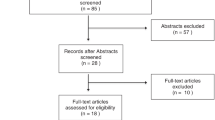Abstract
Oncologists must familiarize themselves with a complex evidence base. Several curricula have been devised, but it is not clear how these are used. We chose breast cancer, since this has a large literature base. Of the 285 radiation and medical oncology trainees in the USA and UK responding to our survey, over 90% reported knowledge of the literature was essential. Just over half of respondents had actually read the ASCO or ESMO curricula, with only 23% reporting that the curricula were important in their learning. Our survey revealed dissatisfaction with current curricula and a demand for more pragmatic literature guidance. We designed an alternative curriculum by using a 21-member peer review group to validate a list of key papers in breast oncology. Oncologists in training need guidance to direct their study. A curriculum based on an International Core Literature Consensus might match the needs of trainees more closely.
Similar content being viewed by others
References
DeVita VT, Hellman S, Rosenberg SA (2004) Cancer: principles and practice of oncology (7th edn). Lippincott Williams and Wilkins, Philadelphia
Muss HB, Roenn JV, Damon LE et al (2005) ACCO: ASCO core curriculum outline. J Clin Oncol 23:2049–2077
Hansen HH, Bajorin DF, Muss HB et al (2004) Recommendations for a global core curriculum in medical oncology. Ann Oncol 16:1603–1612
ASCO (2003) RCP: curriculum for medical oncology www.jchmt.org.uk/medonc/curr_medoncology.pdf. Accessed 2006
Slamon DJ, Leyland-Jones B, Shak S et al (2001) Use of chemotherapy plus a monoclonal antibody against HER2 for metastatic breast cancer that overexpresses HER2. N Engl J Med 344:783–792
Early Breast Cancer Trialists’ Collaborative Group (EBCTCG) (2005) Effects of chemotherapy and hormonal therapy for early breast cancer on recurrence and 15-year survival: an overview of the randomised trials. Lancet 365:1687–1717
Fisher B, Dignam J, Wolmark N et al (1998) Lumpectomy and radiation therapy for the treatment of intraductal breast cancer: findings from National Surgical Adjuvant Breast and Bowel Project B-17. J Clin Oncol 16:441–452
Overgaard M, Hansen PS, Overgaard J et al (1997) Postoperative radiotherapy in high-risk premenopausal women with breast cancer who receive adjuvant chemotherapy. Danish Breast Cancer Cooperative Group 82b Trial. N Engl J Med 337:949–955
Wolmark N, Wang J, Mamounas E et al (2001) Preoperative chemotherapy in patients with operable breast cancer: nine-year results from National Surgical Adjuvant Breast and Bowel Project B-18. J Natl Cancer Inst Monogr 30:96–102
Veronesi U, Paganelli G, Viale G et al (2003) A randomized comparison of sentinel-node biopsy with routine axillary dissection in breast cancer. N Engl J Med 349:546–553
Henderson IC, Berry DA, Demetri GD et al (2003) Improved outcomes from adding sequential Paclitaxel but not from escalating Doxorubicin dose in an adjuvant chemotherapy regimen for patients with node-positive primary breast cancer. J Clin Oncol 21:976–983
Kriege M, Brekelmans CT, Boetes C et al (2004) Efficacy of MRI and mammography for breast-cancer screening in women with a familial or genetic predisposition. N Engl J Med 351:427–437
Holland R, Veling SH, Mravunac M et al (1985) Histologic multifocality of Tis, T1-2 breast carcinomas. Implications for clinical trials of breast-conserving surgery. Cancer 56:979–990
National Institutes of Health Consensus Development Panel (2001) The National Institutes of Health Consensus Development Conference: Adjuvant therapy for breast cancer. Bethesda, Maryland, USA, November 1–3, 2000. Proceedings. J Natl Cancer Inst Monogr, 1–152
Acknowledgments
We thank our peer review panel: Craig Allred, Harry Bear, Harry Bartelink, Charles Coombes, Mitch Dowsett, Matthew Ellis, Bernard Fisher, Barbara Fowble, Jay Harris, Dan Hayes, Gabriel Hortobagyi, Clifford Hudis, Raimund Jakesz, Walter Jonat, Heikki Joensuu, Jean Nabholtz, Larry Norton, Joyce O’Shaughnessy, Abram Recht, Eva Singeltary, and Norman Wolmark. We would also like to acknowledge the assistance of Steven Smith of the American Society of Radiation Oncology in survey administration and of Swati Bansal and Ryan Callahan of Sage Computing in statistical analysis.
Author information
Authors and Affiliations
Corresponding author
Rights and permissions
About this article
Cite this article
Patel, S., Jagsi, R., Cook, N. et al. The International Core Literature Consensus (ICLC): an Alternative Curriculum for Oncologists. J Canc Educ 26, 420–426 (2011). https://doi.org/10.1007/s13187-011-0242-y
Published:
Issue Date:
DOI: https://doi.org/10.1007/s13187-011-0242-y




